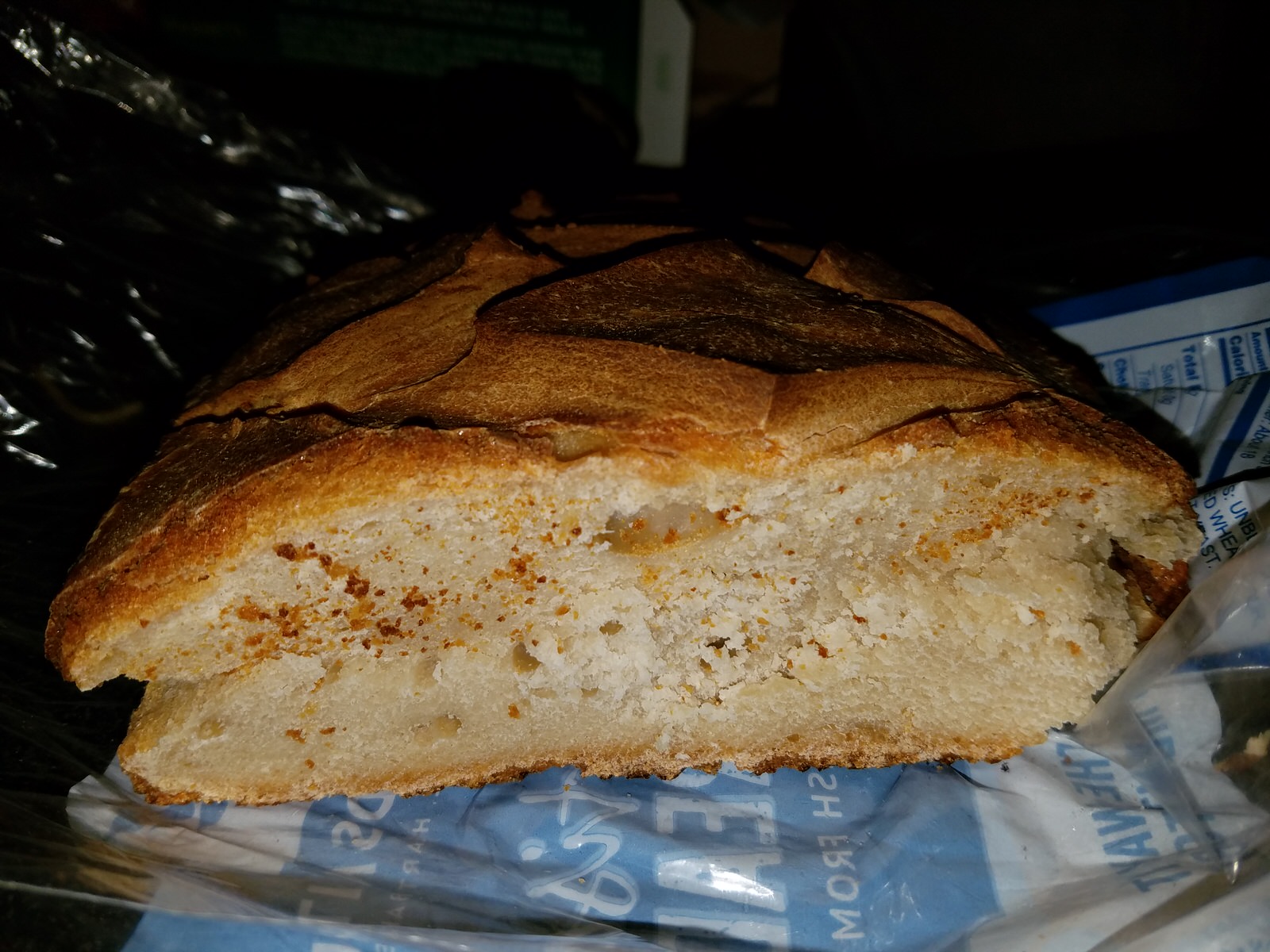
Sourdough bread (dense, no lift, doughy, flat)

Howdy Everyone! I baked Sourdough a few times and I am still practicing :)
I am using this recipe.
- 3 Cups All Purpose Organic Flour
- 2 cups of Sourdough Starter (made of All Purpose Organic Flour)
- 1 1/2 teaspoons kosher salt
- 1 Cup of Water
My technique:
- Mix (Flour and Water)
- Sit for 1 hour (autolyse)
- Add Salt
- Air Knead by lifting the bread and flapping it back over & knuckle knead (10 minutes).
- Tuck and Fold / Paper Fold (Fold in middle both sides & Flip Over)
- Sit for 1/2 hour (autolyse)
- Shaping bread by making a ball then using the palm of your hands to make bread tighter.
- Make the seam, put in a bread pan (Making seam by holding bread and make a cave in)
- Put baking pan (rectangle) covered with olive oil
- Proved overnight (est 7 hours)
Baking:
- Put bread on baking tray (Aluminum) with olive oil.
- Put bread on pan and use lame to make cuts.
- Put in oven at 400 degrees Fahrenheit for 60 minutes.
I store my Sourdough starter in the refrigerator usually. I just took it out and it needed more yeast from the air, so I am using a heating pad and it seems that it's making tons of bubbles already with my 1 to 1 (flour to water) feeds.
I am improving my starter now since it's outside the fridge. I will work on it.
Some more photos of bread:
https://drive.google.com/open?id=0B4-WdQbRjlDjSkRYd1Z4S2ZWSjQ
Instructions from: https://www.youtube.com/watch?v=4rmHklhhabA
How To Make Sourdough Bread + Danny Mccubbin
Recipe from a blog.
Thank you very much for helping me. I am excited.
Sebastian


after your air kneading and before your final proof? Half an hour would not be enough for anything I make with sourdough.
A bit more detail of recipe would also help analyse what is happening.
There is a lot to learn with sourdough and younare off to a good start.
Leslie
Thank you very much! This gives me great hope :D
I wonder how long I should try, maybe I will double it for the proof. I am looking up new recipes for my next try.
Thanks again Leslie.
I am going to look up Bulk Ferment too.
Okay, I'm an amateur too (and new here) so hopefully I'm not overstepping my bounds (and/or knowledge) too much.
- Two cups of starter seems like an awful lot for that much flour. Where'd you get the recipe?
- You didn't mention how much water you added?
- Seven hours of proofing doesn't jibe with two cups of starter. That's a long time for that high of a ratio of starter.
- The yeast doesn't really come from the air, at least not in any way that would happen from being on a heating pad for a few hours. They just need food, warmth (but not too much -- they die at something like 120° F) and time. Generally, the recommendation is to take the starter out of the fridge well in advance of needing it and feeding it. Maybe more than one feeding. Since I don't keep mine in the fridge, I don't really know how much leeway there is in this -- maybe I'm off base.
The whole recipe sounds a bit... suspect. Lots of complicated dough handling, but the fundamental ingredients seem out of balance.
Thanks for the comment Modern Jess. You have gave me great gifts of advice just in time for Christmas XD
Yea! I also feel that the recipe is kind of off. I am going to try to King Arthur Sourdough Recipe and see how that turns out.
Agree with Leslie and Jess here. You're missing out important steps. Plus, that is an awful lot of starter for a 7 hour proof after shaping.
Look up Hamelman's Vemont Sourdough. I think it is a great introduction to sourdough with lovely results.
Awesome! Thank you for your hard work to help me.
I will look into that recipe! :D
and ask him to turn on your private messages and then i'll send it to you
floyd@thefreshloaf.com
I sent him a message to activate my private messages.
Thanks a lot!
I just got a message from him saying the private messages are now activated on my account.
Just sent you a message.
Is this a 1 2 3 recipe that have exchanged the water for the starter?
123 is
1 starter
2 water
3 flour
like
1 cup of starter
2 cups of water
3 cups of flour
Should be by weight, not cups.
Even if he didn't exchange it'll still be off if he used cups but stuck to 1:2:3.
72% hydration wich is very close to the 123 of a bit over 71% hydration. It should work well enough if the proceedure was more standard and watching the dough instead of the clock.
I don't think so. I used:
3 cups all-purpose flour
2 cups of sourdough starter
1 Cup of warm water
Thank you for your help. I hope you have an Awesome Day! :D
I assume you don't have one now. Flour measured by volume can differ by 20% or more in weight depending how it's scooped and how packed it is, and starter can vary by that much if not more depending on its state of activity / maturation. So you can easily be making a different recipe each time even though the volume measurements are the same.
I will measure my flour, and sourdough starter, and water for now on. It seems crucial for success.
Thanks counselor.
Sebastian.
If your starter is 100% hydration (if using cups to measure 1:1 then it will be more, so use less water), then for your recipe I would us 1/2 cup of active starter. I don't like using volume measurements instead of weight, but sometimes I find myself converting recipes to weights so this might be closer to what you want. I would hold back a little of the water until you see how it feels, then add water as needed. I do not recommend doing the opposite and adding flour to dry it out. This can make it so you don't have enough salt or starter for the time frame.
If your starter was used right from the refrigerator, then things are going to go slow. That is also assuming that it is active right from cold storage. It is better to give it a feeding or two before using. Even if it is taking some of the refrigerated starter and doing a build off that small amount for the next day's bread, it will help.
Your recipe doesn't say to add the starter. I assume that is the first step, but could be done when the salt is added. Your bulk fermentation is too short (before shaping), and your final proof is too long (after shaping). Did the dough rise up?
Thank you for your advice! I have a scale too, but I haven't thought that it would be so important! (Very Important)
Yea my starter needed activation again. Yesterday, I put my Sourdough starters on a heating pad, and fed it once. Now it's all bubbly again and back to life. I am still confused about the consistency. It is almost like a pancake batter, but a little bit thicker.
Correct! I added two cups of Sourdough starter that wasn't ready at the start. I am still working on my Starter, and I am feeding it regularly now out of the fridge.
I will figure out a new time for bulk fermentation (Your advice makes great intuitive sense). I will also figure out a good time for the final proof. I didn't really pay attention to the final proof size. It seemed that it didn't double in side, but widened in the bread pan a bit.
Thank you very much! Have an Awesome day, you deserve it. ;D
It sounds like the culprit is an inactive starter. The consistency when you feed it is a thick pancake batter. When you use it, it should be very bubbly and frothy and full of life.
Yea I think so too. I also think it's a lot of factors. Like not weighing my ingredients, proving too long in the fridge, and not waiting enough for Bulk fermentation.
I am learning a lot on these forums. Thanks MichaelLily for all your help.
Sebastian :)
In case you haven't been doing this already, when you refrigerate your starter after feeding it, you should do so before it peaks. How long it will take to peak depends on various things including your starter, your feeding ratio, the room temp, etc.
Personally, I just leave it out for somewhere around 2-3 hours. Within the usual range of my room temp, I know it will still be pre-peak then. I'm not picky enough to worry exactly how much the volume has increased, so it might be 1.5x one time and 1.75x another time. But that's just me; there's certainly nothing wrong with trying to be more precise if that suits you.